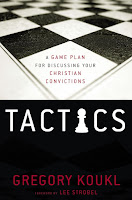Introduction
As I have argued in many different posts it is important that we not be afraid of someone challenging our views. If we are committed to truth, then we will naturally desire to know when we have believed something false. In his book Tactics: A Game Plan for Discussing Your Christian Convictions, Greg Koukl explains how such challenges to our views may actually be beneficial:"A commitment to truth -- as opposed to a commitment to an organization -- means an openness to refining one's own views. It means increasing the accuracy of one's understanding and being open to correction in thinking. A challenger might turn out to be a blessing in disguise, an ally instead of an enemy. An evangelist who is convinced of her view, then, should be willing to engage the best arguments against it."
The Blessing
When a challenge comes against our view, that is an opportunity for us to see exactly how accurately that view reflects reality. We can see how strong the arguments are for the truth of our view and how strong the arguments are against the truth of our view. If our view is actually true, then it will be able to withstand the most powerful arguments against it. These arguments will be found to be faulty in one way or another- a false premise or invalid logic. If we cannot find the logical fault in the argument against our view, then we need to consider the possibility that our view is false and needs to be altered.As evangelists for the Gospel of Jesus Christ, it is important that we engage challenges to our particular views of reality. For if we hold to and defend a false view, then those who see the fault with our arguments will project that falsehood onto the Gospel. We must not hold to a view when the arguments against it cannot be overcome, lest we misrepresent Christ to an unbelieving world. If we find that we must change one aspect of our worldview, it does not mean that the whole worldview must be changed. However, that one aspect must be changed to provide a more accurate witness of Christ.
Conclusion
Koukl's book explains how to navigate conversations in a winsome manner that allows us to not only get the other person thinking about their worldview, but it allows us to consider the other person's points and arguments without feeling threatened. If you have not read Tactics: A Game Plan For Discussing Your Christian Convictions, I highly recommend that you pick up a copy.Recommended Reading To Investigate Further:
- 3 Good Reasons to Question What You Believe
- Is Your View Falsifiable?
- Internal Debates and Apologetics
- Reasons In And Out of a Worldview
Follow Faithful Thinkers On Social Media











